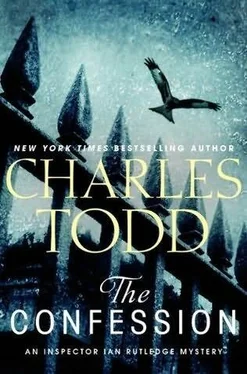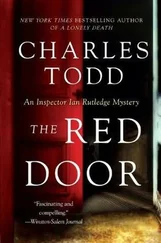Charles Todd - The Confession
Здесь есть возможность читать онлайн «Charles Todd - The Confession» весь текст электронной книги совершенно бесплатно (целиком полную версию без сокращений). В некоторых случаях можно слушать аудио, скачать через торрент в формате fb2 и присутствует краткое содержание. Жанр: Полицейский детектив, на английском языке. Описание произведения, (предисловие) а так же отзывы посетителей доступны на портале библиотеки ЛибКат.
- Название:The Confession
- Автор:
- Жанр:
- Год:неизвестен
- ISBN:нет данных
- Рейтинг книги:5 / 5. Голосов: 1
-
Избранное:Добавить в избранное
- Отзывы:
-
Ваша оценка:
- 100
- 1
- 2
- 3
- 4
- 5
The Confession: краткое содержание, описание и аннотация
Предлагаем к чтению аннотацию, описание, краткое содержание или предисловие (зависит от того, что написал сам автор книги «The Confession»). Если вы не нашли необходимую информацию о книге — напишите в комментариях, мы постараемся отыскать её.
The Confession — читать онлайн бесплатно полную книгу (весь текст) целиком
Ниже представлен текст книги, разбитый по страницам. Система сохранения места последней прочитанной страницы, позволяет с удобством читать онлайн бесплатно книгу «The Confession», без необходимости каждый раз заново искать на чём Вы остановились. Поставьте закладку, и сможете в любой момент перейти на страницу, на которой закончили чтение.
Интервал:
Закладка:
There were no stragglers. One minute nothing but tall grass sweeping in waves before the wind, and then the first dwelling appeared, square, brick, and squat beneath its roof. Seven more bungalows, and they were in the High Street, where on the left, others were interspersed among the shops. Beyond stood a small two-storey inn, and where the road curved to the north, a large plane tree towered over the cottages nearest to it.
To the right-hand side of the road, other buildings stood with their backs to the river, among them what appeared to be a schoolhouse, and just after the pub he glimpsed the water stairs. On the strand beyond, there were fishing boats drawn up, waiting for the tide to turn. One or two were flatter-bottomed craft used to hunt waterfowl.
Although it was a Saturday afternoon, the village street was deserted, and as they reached the bend in the road, Rutledge recognized the hook of land he’d seen on the map at the Yard.
The wind had continued to pick up, and as they followed the bend that took the road inland, the motorcar swayed with the force of it. Here the village ended with a house or two like afterthoughts, and to the right beyond the last of the houses the road rose a little, telling him that this hook of land was higher than the village and therefore possessed better drainage. In proof of it, he saw farms ahead and counted three of them before the road turned inland again and the marshy ground reappeared in the distance. Which of the farms had been the site of the airfield? There were no derelict buildings to tell him which had been commandeered. And all three offered broad stretches of pasturage and a few fields of corn for livestock that were flat enough for aircraft to take off and land. Ideal, then, for a small squadron of night fighters and Zeppelin patrols. What’s more, it was right on the North Sea, with excellent visibility when the sea mists weren’t rolling in.
Frances was saying, “Did you notice? There’s no church to be seen in the village. And no churchyard. How odd! Where do they bury their dead? And there’s no real hotel, is there? Only that tiny inn. It can’t have more than six rooms, and most likely only four. And the way people stared at us, they aren’t used to strangers, are they? I doubt we’ll be dining here after all.”
She was right, he thought. There was no welcome in Furnham. He turned the motorcar and drove back to the village. A few weathered sheds stood back above the tide line, beyond where the boats were drawn up, and a track led out to them.
He pulled up the brake and got out. Frances came to join him and quickly put her hand on her hat. Here the sweep of the wind was fierce.
She hurried back to the motorcar, saying, “You aren’t walking down to the water, are you? It’s about to rain.”
“No.” He could see all he needed to see from where he stood. The wind-whipped water was frothy, as if seething just below the surface. Looking over his shoulder, he could see that rain was imminent, and with it would come colder air. He stayed for a moment longer, watching the boats rock as the tide toyed with them. Beyond was the narrow estuary, and a line of mild turbulence where the river met the sea. Returning to the motorcar, he drove on.
Behind the pub, he glimpsed a seawall where larger craft were tied up, bobbing at anchor, their masts swaying. Slowing again, he watched as a man in a heavy fisherman’s sweater and wool cap came up between two houses, moving briskly along what must be a path. Without looking in their direction, he turned toward the shops and disappeared into one of them.
“I feel overwhelmed by the warmth of our reception,” Frances commented wryly. “Are we leaving, do you think?”
“Not just yet,” Rutledge answered. He wasn’t sure what he’d hoped to find here in Furnham. Whatever it was, he was still unsatisfied.
There were others on the street now, and the feeling that the village must be as deserted as River’s Edge lessened. But the air of friendliness often encountered in summer was still missing. Frances was a very attractive young woman, and yet none of the men had even glanced her way. It was almost as if they wished to discourage any excuse for personal contact.
He’d no more than thought that when a short, heavyset man coming their way stopped and said brusquely, “Looking for someone?”
Not “Can I help you?” or “New to Furnham, are you?”
“Actually,” Rutledge answered, pulling up, “we were wondering where we might have lunch.”
The man considered them. “We don’t run to restaurants,” he replied. “Not here. You might find something more to your liking back the way you’ve come.”
But there was nothing back the way they’d come. Not for miles. While over the man’s shoulder, Rutledge could see what appeared to be a small shop of no particular distinction perhaps, but most certainly catering to the local people. He thanked the man, who walked on without another word.
Rutledge pulled to the far side of the street, indicating the shop.
“We might try our luck here,” he suggested. “Not precisely the Michelin Guide, but we could do with a cup of tea, don’t you think?”
“Ian,” Frances said quietly, “I really feel we ought to take the none-too-subtle hint and be on our way. In fact, I’ve rather lost any appetite I might have had.”
“Quite,” he answered but nodded toward the shop as two women stepped out and turned up the street, not looking at them. “All the same, it could be two hours or more before we find a suitable restaurant. Let’s take our courage in our hands and go inside. Those women seem to have survived the experience.”
Frances laughed. “You are impossibly optimistic.”
Coming around to open her door for her, he added, “Surely not everyone in Furnham is churlish. There could even be a friendly smile inside that door.”
But as they stepped into what turned out to be a small tearoom-cum-bakery, he caught the quick look the woman behind the counter gave them and watched her mouth turn down, as if she resented their intrusion.
It was cozy enough, inside out of the wind. Pretty blue checkered linen covered the tables, and the chairs were painted white. A large mural along the back wall showed the sea on a sunny day, the water as blue as the sky, and white puffs of cloud sailing along the horizon. A man and a woman sat on the strand, a picnic basket between them, while three children splashed in the water or built sand castles with the aid of a small green bucket and a white shovel. It was unexpectedly good workmanship. A local artist, or someone from the flying field?
The woman was saying, “Sorry, love, we’re just closing.” In spite of the friendly words, her voice was cold.
The three elderly women sitting in the far corner turned to look in Rutledge’s direction, taking in what his sister was wearing, and then turning away, as if they’d lost interest.
“I expect,” he said pleasantly, “that you could provide a cup of tea for two travelers who have lost their way.” He ushered Frances to a table and stood waiting for the woman to answer.
With poor grace, she said, “A cup of tea then.”
Frances was about to protest, saw her brother’s expression, and sat down in the chair he was holding for her.
As he joined her at the table to await their tea, Frances said quietly, “This is Yard business, isn’t it?”
Without denying it, Rutledge looked out the window at the buildings straggling along the riverfront across the way. One, he thought, was indeed a small schoolhouse, and another appeared to be a shoemaker’s shop, a third a chandler’s. Furnham gave him the impression that it hadn’t changed since Queen Victoria’s day. And its inhabitants seemed to be intent on keeping it that way.
Читать дальшеИнтервал:
Закладка:
Похожие книги на «The Confession»
Представляем Вашему вниманию похожие книги на «The Confession» списком для выбора. Мы отобрали схожую по названию и смыслу литературу в надежде предоставить читателям больше вариантов отыскать новые, интересные, ещё непрочитанные произведения.
Обсуждение, отзывы о книге «The Confession» и просто собственные мнения читателей. Оставьте ваши комментарии, напишите, что Вы думаете о произведении, его смысле или главных героях. Укажите что конкретно понравилось, а что нет, и почему Вы так считаете.












